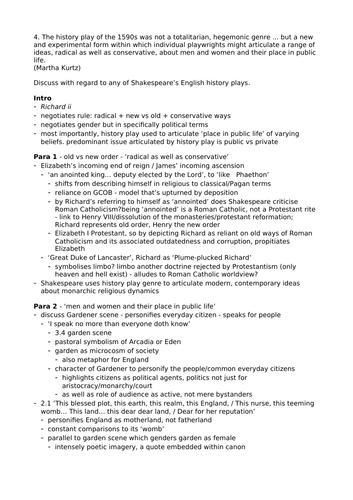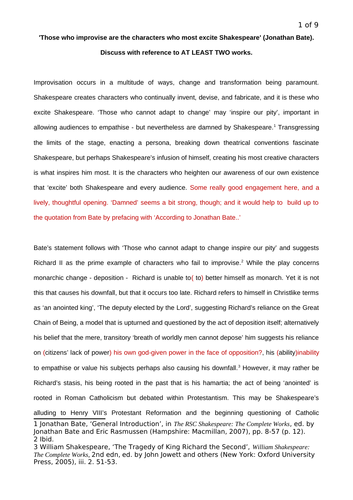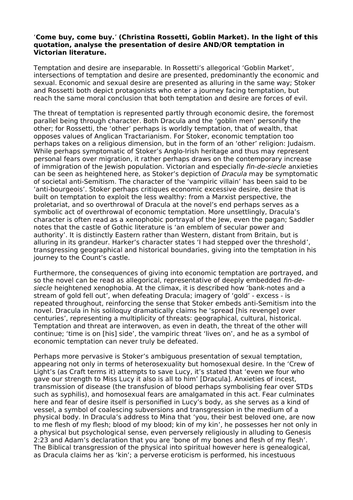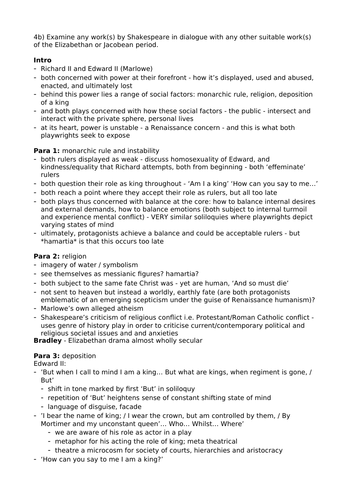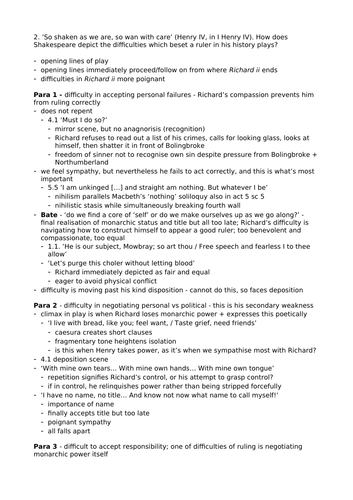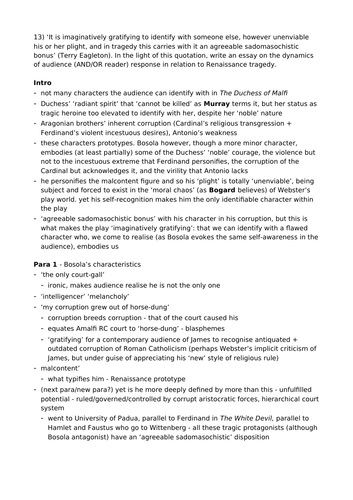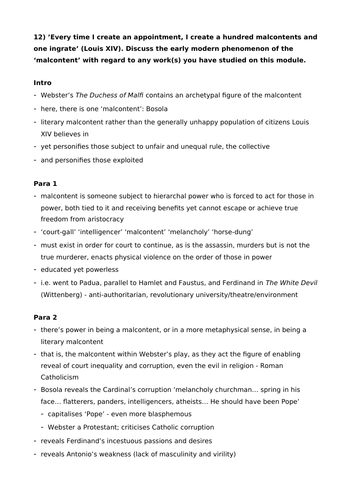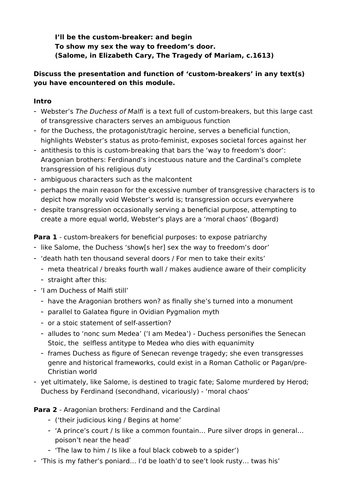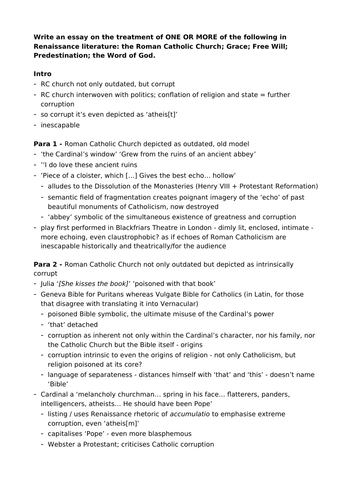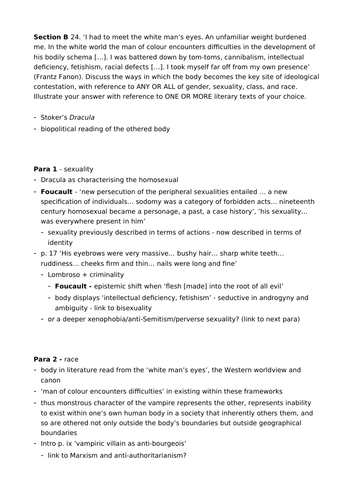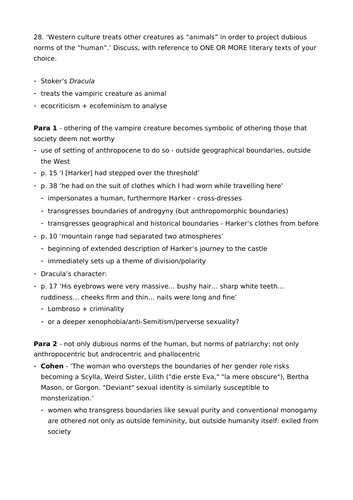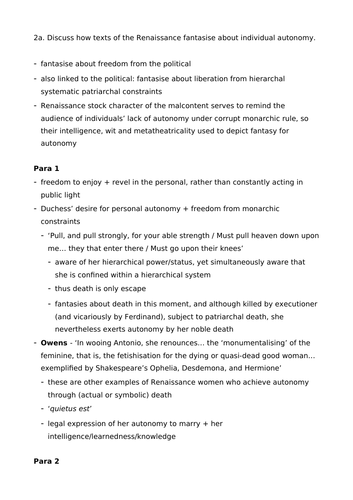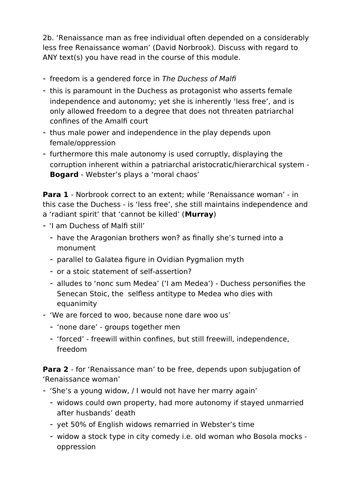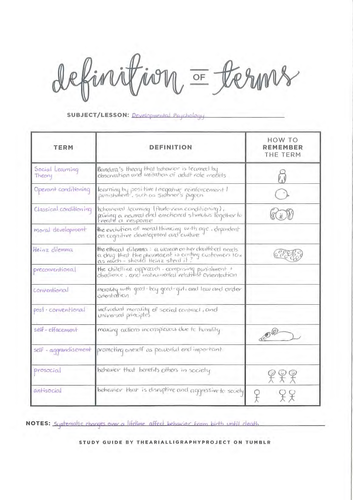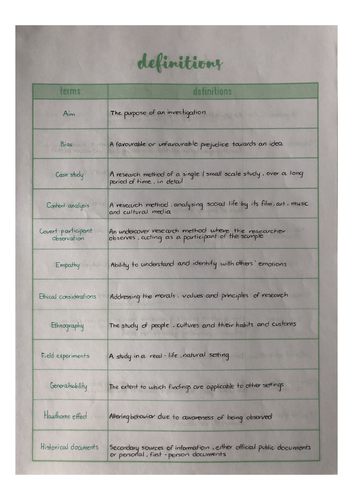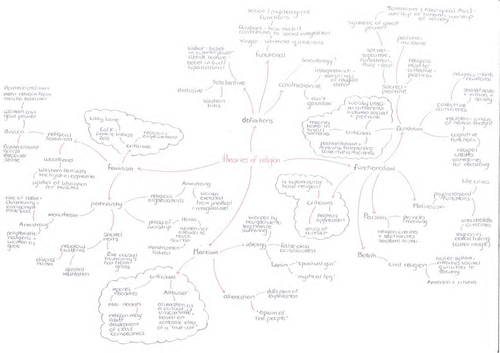
89Uploads
22k+Views
1k+Downloads
All resources
Bundle

Essay Plan bundle: Virginia Woolf
3 in-depth university-level essay plans, and 1 essay on Virginia Woolf.
Essay plan themes: feeling; impressions and senses; symbolism.
Essay theme: family life.
Includes discussions and analyses of multiple works such as Sketch, To the Lighthouse, Mrs Dalloway, and A Room of One’s Own. The essay is fully referenced with a MHRA bibliography.
Written by a Durham University English Literature BA graduate. Ideal resource for A-level and university students.
Bundle

Essay Plan Bundle: T.S. Eliot
6 in-depth university-level essay plans on T.S. Eliot’s poetry in response to 6 exam questions.
Essay plan themes: despair, mysticism and spirituality, social change, symbolism, the body and materiality, and voice.
Discusses poems such as Ash Wednesday, The Love Song of J. Alfred Prufrock, Marina, The Waste Land, and Four Quartets.
Written by a Durham University English Literature BA graduate. Ideal resource for A-level and university students.
Bundle

Essay Plan Bundle: Katherine Mansfield
4 in-depth university-level essay plans on Katherine Mansfield’s short stories.
Essay plan themes: gender, psychoanalysis, symbolism, the outsider.
Discusses stories such as The Garden Party, Bliss, Je ne parle pas Francais, and Mansfield’s own autobiographical context.
Written by a Durham University English Literature BA graduate. Ideal resource for A-level and university students.

Essay Plan: Richard ii & Radicalism
An essay plan on Shakespeare’s history play, Richard ii, written by a second-year undergraduate at Durham University.
It answers the question:
‘The history play of the 1590s was not a totalitarian, hegemonic genre … but a new and experimental form within which individual playwrights might articulate a range of ideas, radical as well as conservative, about men and women and their place in public life.’ (Martha Kurtz)
Discuss with regard to any of Shakespeare’s English history plays.
The plan discusses the genre of the history play, analysing the language, symbolism and metaphors within Richard ii. The context of Elizabethan/Jacobean England, Protestantism and Roman Catholicism, is embedded into the plan.
Can be used for university or A-level.

Essay: Shakespeare's Tragedy Plays
This essay deals with Shakespeare’s tragedy plays, Richard ii, Macbeth, The Tempest, and Hamlet and the theme of improvisation within these.
It answers the question: ‘Those who improvise are the characters who most excite Shakespeare’ (Jonathan Bate). Discuss with reference to AT LEAST TWO works.
Dramatic techniques such as meta-theatricality, Shakespeare’s personification of characters as himself, and the fourth wall are discussed. Also discusses historical constructs of the Great Chain of Being and Divine Right of Kings.
The essay is fully referenced with a MHRA bibliography. Also includes feedback from a professor throughout the essay (in red) - useful for identifying strengths and weaknesses.
Useful for university, A-level, and GCSE students. Includes quotes, analysis, wider historical context, alternative interpretations, and discussion of critics’ quotations. Written by a second-year undergraduate at Durham University.

Model Essay: Dracula and Goblin Market Comparison
Essay on Bram Stoker’s novel Dracula and Christina Rossetti’s poem ‘Goblin Market’ on the theme of temptation and desire.
It answers the question:
‘Come buy, come buy.’ (Christina Rossetti, Goblin Market). In the light of this quotation, analyse the presentation of desire AND/OR temptation in Victorian literature.
The essay breaks down two types of desire: economic desire and greed, and sexual temptation. It discusses religious influences on both works in terms of Anglican Tractarian values, and Judaism, and the portrayal of anti-Semitism in Dracula. It also compares Dracula with the earlier novella by Sheridan Le Fanu, ‘Carmilla’. Themes of lesbianism and homosexuality, the Victorian ghost story, Gothic literature, and more, are analysed.
Also includes feedback and comments from another literature student. Excellent resource for university and A-level students.
Written by a second-year undergraduate at Durham University.

Essay Plan: Richard ii & Edward ii
This essay plan compares Shakespeare’s history play, Richard ii, with Edward Marlowe’s play, Edward ii, in the context of Elizabethan/Jacobean England.
It answers the question: Examine any work(s) by Shakespeare in dialogue with any other suitable work(s) of the Elizabethan or Jacobean period.
The plan primarily dissects monarchic power and instability, religion, and deposition, comparing the similarities between both plays.
Written by a second-year undergraduate at Durham University.

Essay Plan: Richard ii & Rulership
This essay plan on Shakespeare’s history play, Richard ii, answers the question: ’So shaken as we are, so wan with care’ (Henry IV, in I Henry IV). How does Shakespeare depict the difficulties which beset a ruler in his history plays?
It deals with the character of Richard ii and his compassion, his difficulty in distinguishing between personal and political boundaries, and the difficulty he faces in accepting monarchic responsibility.
Written by a second-year undergraduate at Durham University.

Essay Plan: The Duchess of Malfi - Identification
Essay plan on John Webster’s The Duchess of Malfi on the theme of audience identification.
It answers the question:
‘It is imaginatively gratifying to identify with someone else, however unenviable his or her plight, and in tragedy this carries with it an agreeable sadomasochistic bonus’ (Terry Eagleton). In the light of this quotation, write an essay on the dynamics of audience (AND/OR reader) response in relation to Renaissance tragedy.
The plan deals primarily with the character of Bosola. It argues that his character’s anti-authoritarian and transgressive characteristics allow the audience to identify with his character.
Written by a finalist at Durham University. Excellent resource for A-level and university students.

Essay Plan: The Duchess of Malfi & the Malcontent
Essay plan on John Webster’s The Duchess of Malfi which discusses the figure of the malcontent.
It answers the question:
’Every time I create an appointment, I create a hundred malcontents and one ingrate’ (Louis XIV). Discuss the early modern phenomenon of the ‘malcontent’ with regard to any work(s) you have studied on this module.
The plan deals primarily with the character of Bosola. It argues that he plays a role in exposing the corruption of the Amalfi court within the play, using wider historical context of the Jacobean period.
Written by a finalist at Durham University. Excellent resource for A-level and university students.

Essay Plan: The Duchess of Malfi & Transgression
Essay plan on John Webster’s drama The Duchess of Malfi on the theme of transgression.
It answers the question:
I’ll be the custom-breaker: and begin
To show my sex the way to freedom’s door.
(Salome, in Elizabeth Cary, The Tragedy of Mariam, c.1613)
Discuss the presentation and function of ‘custom-breakers’ in any text(s) you have encountered on this module.
This plan looks at characters such as the protagonist, the Duchess, the malcontent, Bosola, and the antagonistic Ferdinand and the Cardinal. Analyses language and key quotes from the play. Looks at incest, immorality, corruption. Includes interpretations from critics.
Written by a finalist at Durham University. Excellent resource for A-level and university students.

Essay Plan: The Duchess of Malfi & Catholicism
Essay plan on John Webster’s drama The Duchess of Malfi on the theme of Catholicism.
It answers the question: Write an essay on the treatment of ONE OR MORE of the following in Renaissance literature: the Roman Catholic Church; Grace; Free Will; Predestination; the Word of God.
This plan looks at the Roman Catholic Church in the context of Jacobean England and its depiction in the play as outdated, corrupt, and inescapable for the play’s characters.
Analyses language: allusions, symbolism, parallelisms, etc.
Looks at wider historical context of various Bibles, Rome, Renaissance rhetoric, the Protestant Reformation, etc.
Written by a finalist at Durham University. Excellent resource for A-level and university students.

Essay Plan: Dracula & Biopolitics
This essay plan interprets Bram Stoker’s novel Dracula through a biopolitical lens.
It answers the question:
‘I had to meet the white man’s eyes. An unfamiliar weight burdened me. In the white world the man of colour encounters difficulties in the development of his bodily schema […]. I was battered down by tom-toms, cannibalism, intellectual deficiency, fetishism, racial defects […]. I took myself far off from my own presence’ (Frantz Fanon).
Discuss the ways in which the body becomes the key site of ideological contestation, with reference to ANY OR ALL of gender, sexuality, class, and race. Illustrate your answer with reference to ONE OR MORE literary texts of your choice.
It discusses sexuality and homosexuality using Foucault’s The History of Sexuality. It also discusses the role of racial prejudice in writing Dracula’s character, as well as androgyny, Marxism, anti-Semitism, and xenophobia during the fin-de-siecle. Lastly, it discusses class, again linking this to wider historical context and other literary works that depict the ‘other’.
Excellent resource for A-level and university students. Written by a finalist at Durham University.

Essay Plan: Dracula & Eco-criticism
Essay plan on Bram Stoker’s novel Dracula through an ecocritical and ecofeminist lens.
It answers the question:
‘Western culture treats other creatures as “animals” in order to project dubious norms of the “human”.’ Discuss, with reference to ONE OR MORE literary texts of your choice.
The essay plan discusses the role of the anthropocene in othering the figure of the vampire, as role as gender ambiguity and androgyny. It also discusses the animalisation of Dracula’s character being rooted in anti-Semitism.
Includes critical quotations, analysis of quotations within the novel, and multiple interpretations. Excellent resource for A-level and university students.
Written by a second-year undergraduate at Durham University.

Essay Plan: The Duchess of Malfi & Autonomy
An essay plan on John Webster’s The Duchess of Malfi on the theme of individual autonomy.
It answers the question: Discuss how texts of the Renaissance fantasise about individual autonomy.
The plan discusses freedom in regards to women during the Jacobean era, as well as male autonomy, corruption, patriarchy, power and independence vs oppression, etc. Engages with critical quotations and analyses language within the play.
Excellent resource for university and A-level students. Written by a Durham University second-year student.

Essay Plan: The Duchess of Malfi & Freedom
An essay plan on John Webster’s The Duchess of Malfi on the theme of freedom.
It answers the question:
‘Renaissance man as free individual often depended on a considerably less free Renaissance woman’ (David Norbrook). Discuss with regard to ANY text(s) you have read in the course of this module.
The plan discusses freedom in regards to women during the Jacobean era, as well as male autonomy, corruption, patriarchy, power and independence vs oppression, etc. Engages in a dialogue with the critical quotation in the question.
Excellent resource for university and A-level students. Written by a Durham University second-year student.

A* Analysis of Owen Sheers' Skirrid Hill poems
Concise but detailed 10-poem bundle.
Analysis by an A* student! including language and structure, literary terminology, context behind poems, alternative interpretations, critical quotations and themes/groupings of poems.
For WJEC Eduqas A-level English Literature but can be used for any exam board.
Includes: Mametz Wood, The Farrier, Drinking with Hitler, The Fishmonger, The Wake, Valentine, Night Windows, Joseph Jones, Inheritance, and Hedge School.

OCR Core studies A* key terms
A* summary of key terms for biological, developmental, cognitive and social psychology areas.
Includes assumptions of each area, memorable pictures and definitions for each term.
For OCR H167/G567 specification but can be used for AQA/Edexcel/Eduqas etc.

A-level Sociology/Psychology Methods Keywords
Concise summary tables of all research methods key terms for AQA A-level/AS sociology. Can also be used for OCR/Eduqas/WJEC/Edexcel and psychology.
Great for revision and self-testing!

A* A-level Sociology Beliefs Religion mindmaps
In depth, concise notes on everything in the A-level A2 spec for AQA sociology for religion/beliefs.
Can be used for OCR/Eduqas/Edexcel/WJEC.
Includes: Marxist/feminist/functionalist/postmodernist theories, secularisation, religious fundamentalism, ideology and science, new religious movements, social change, typologies, and examples!




